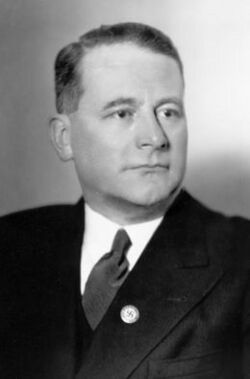Leopoldism

Leopoldism (Weranian: Leopoldismus) was a political doctrine in Werania articulated by the monarch Leopold IV following the Great War. Its supporters were called Leopoldists and became influential in the Weranian government from the early 1930's to Leopold IV's death in 1936.
During the war Leopold IV increasingly began to set forth plans for a radical restructuring of the Weranian nation when the war was over, seeing the pre-war political class as corrupt, lacking foresight and putting their interests before the nation. Leopold IV advocated an essentially non-partisan system of democracy based on a stronger role for the monarch, a more advisory legislature, a shift away from federalism in favour of greater centralisation and the more frequent use of plebiscites in determining national policy. Leopold IV also endorsed making colonial territories integral parts of the Weranian state and pursuing an economic policy based around dirigisme.
In 1932 Otto Röttgen, considered to be within Leopoldist circles, was appointed Chancellor in the so-called "Leopoldist cabinet". The Leopoldists reached the height of their power following the end of the Great War when Leopold IV started to implement his political programme, particularly in administrative and economic spheres. A highly unpopular centralisation law and the imposition of Weranicisation in Ruttland led to Leopold IV to be assassinated by a Ruttish nationalist, Zigmas Bobelis, on the 17 September 1936. Leopoldism quickly fell out of favour after his son and successor Maximilian III did little to implement his father's vision. Historian Martin Werner stated that Leopoldism was the "last attempt by a Weranian monarch to impose their own coherent political programme".
History
Origins
Leopold IV became the monarch of Werania - the Holder of the Bundespräsidium - in 1913 during a period of political turmoil in Werania. Chancellor Lothar von Kuehnelt had expanded the suffrage and amended the voting system in 1909 which meant that Weranian parliaments (previously dominated by a two-party system) became increasingly fragmented. Leopold IV in contrast to his father envisioned himself to govern as a more constitutional monarch on the Estmerish model (Leopold IV being a greater admirer of Estmerish culture) and so allowed the Bundestag to determine the government and chancellor rather then the monarchy. However the advent of the Great Collapse shortly after his assumption of office led to the political scene to devolve into greater instability and extremism. As parties deemed to be extremist gained ground in successive elections (Weranic Section of the Workers' International, National Völkisch Movement, Weranic Syndicalist Union, National Resurrection Party) governments increasingly became centrist coalitions that spanned from centre-left social democrats to right-wing conservatives.
These coalitions requiered constant compromises in order to retain power leading to governance to become slow and resistant to change. In the face of the economic instability emanating from the economic crash and the rise of functionalist Gaullica this frustrated Leopold IV and his advisers who wanted decisive action from politicians to deal with the country's problems. In a letter to his wife Princess Sophia of Estmere in 1925 Leopold wrote
But how I despise of our current political situation. The deputies endlessly argue and debate about the most banal of topics whilst forces against the state - both outside and within - threaten our very existence. Ah, but only if I had my fathers' brilliance to order these politicians into line!
— Leopold IV
During the Great War Leopold IV became hugely popular due to his frequent radio speeches calling for the continuation of the war as well as occasionally visiting and leading troops on the front. Several politicians attempted to persuade Leopold IV to create a royal dictatorship but he refrained from doing so citing that the constitutionality of the state was paramount.
However Leopold IV during the war did centralise power in the war council, empowering the executive and the military staff at the expense of the Volkstag. He also exercised his discretion in appointing Chancellors rather then listening to the will of the Volkstag. This was justified on the grounds that it was to support the war effort but was the start of increasing measures by Leopold IV to de-legitimise the role of political parties in Weranian public life.
Application
During the Great War Leopold IV surrounded himself with a small coterie of advisers on the future direction of the Weranian state. These included politicians, economists and intellectuals that shared his instinct for a new society to emerge in a post-war Werania. This informal group came from a wide variety of political backgrounds - although a majority came from conservative or Sotirian backgrounds some were national liberals or even socialists.
One of the most prominent Leopoldists was the philosopher Dietrich Olbrich. Olbrich had acquired some note due to his anti-positivist political philosophy and coining of instrumentality and value-rationalism but soon came to promote a strong civic state based around Leopold IV coached both in rationalism and nationalism over political expediency. Alongside other Leopoldists Olbrich was most prominent in articulating Leopold IV's political inclinations into a coherent political programme that would favour a authoritarian, centralised state based on a charismatic authority, popular support over elitist oligarchy and rationalism over reactionary conservatism. In this Olbrich emphasised the synthesis between both the liberal rationalism of Werania's first monarch, Rudolf VI, and of the authoritarian conservatism of Leopold IV's father Adalbert which according to Olbrich more broadly reflected the twin forces of civic and romantic nationalism that drove Weranian Unification and as such the very basis of the Weranian nation.
